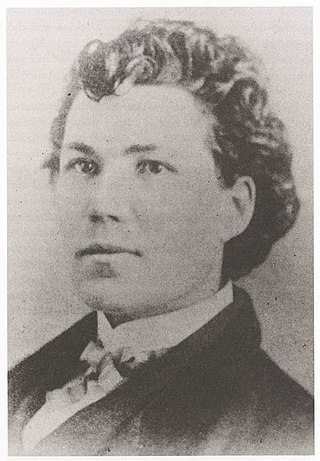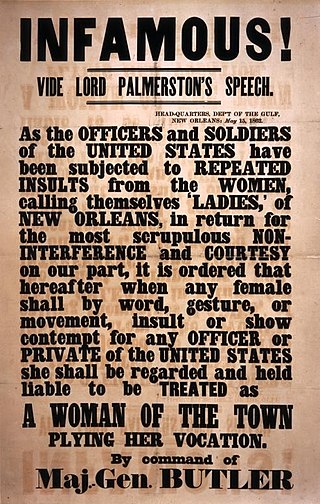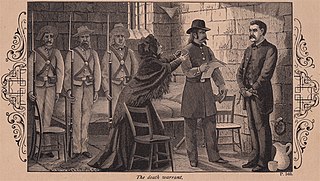Related Research Articles

The spy film, also known as the spy thriller, is a genre of film that deals with the subject of fictional espionage, either in a realistic way or as a basis for fantasy. Many novels in the spy fiction genre have been adapted as films, including works by John Buchan, le Carré, Ian Fleming (Bond) and Len Deighton. It is a significant aspect of British cinema, with leading British directors such as Alfred Hitchcock and Carol Reed making notable contributions and many films set in the British Secret Service.

The United Daughters of the Confederacy (UDC) is an American neo-Confederate hereditary association for female descendants of Confederate Civil War soldiers engaging in the commemoration of these ancestors, the funding of monuments to them, and the promotion of the pseudohistorical Lost Cause ideology and corresponding white supremacy.

Rose O'Neal Greenhow was a famous Confederate spy during the American Civil War. A socialite in Washington, D.C., during the period before the war, she moved in important political circles and cultivated friendships with presidents, generals, senators, and high-ranking military officers including John C. Calhoun and James Buchanan. She used her connections to pass along key military information to the Confederacy at the start of the war. In early 1861, she was given control of a pro-Southern spy network in Washington, D.C., by her handler, Thomas Jordan, then a captain in the Confederate Army. She was credited by Jefferson Davis, the Confederate president, with ensuring the South's victory at the First Battle of Bull Run in late July 1861.
Tactical or battlefield intelligence became vital to both sides in the field during the American Civil War. Units of spies and scouts reported directly to the commanders of armies in the field, providing details on troop movements and strengths. The distinction between spies and scouts was one that had life or death consequences: if a suspect was seized while in disguise and not in his army's uniform, he was often sentenced to be hanged. A spy named Will Talbot, a member of the 35th Battalion, Virginia Cavalry, was left behind in Gettysburg after his battalion had passed through the borough on June 26–27, 1863. He was captured, taken to Emmitsburg, Maryland, and executed on orders of Brig. Gen. John Buford.

Maria Isabella Boyd, best known as Belle Boyd was a Confederate spy in the American Civil War. She operated from her father's hotel in Front Royal, Virginia, and provided valuable information to Confederate General Stonewall Jackson in 1862.

Elizabeth Van Lew was an American abolitionist, Southern Unionists, and philanthropist who recruited and acted as the primary handler an extensive spy ring for the Union Army in the Confederate capital of Richmond during the American Civil War. Many false claims continue to be made about her life. The single most reliable source is a 2002 biography by University of Virginia professor Elizabeth R. Varon.

Sarah Emma Edmonds was a British North America-born woman who claimed to have served as a man with the Union Army as a nurse and spy during the American Civil War. Although recognized for her service by the United States government, some historians dispute the validity of her claims as some of the details are demonstrably false, contradictory, or uncorroborated.

Tinker Tailor Soldier Spy is a 1974 spy novel by the author and former spy John le Carré. It follows the endeavours of the taciturn, ageing spymaster George Smiley to uncover a Soviet mole in the British Secret Intelligence Service. The novel has received critical acclaim for its complex social commentary—and, at the time, relevance, following the defection of Kim Philby. It was followed by The Honourable Schoolboy in 1977 and Smiley's People in 1979. The three novels together make up the "Karla Trilogy", named after Smiley's long-time nemesis Karla, the head of Soviet foreign intelligence and the trilogy's overarching antagonist.
The Confederate Secret Service refers to any of a number of official and semi-official secret service organizations and operations performed by the Confederate States of America during the American Civil War. Some of the organizations were directed by the Confederate government, others operated independently with government approval, while still others were either completely independent of the government or operated with only its tacit acknowledgment.

General Order No. 28 was a military decree made by Maj. Gen. Benjamin Butler during the American Civil War. Following the Battle of New Orleans, Butler established himself as military commander of that city on May 1, 1862. Many of the city's inhabitants were strongly hostile to the Federal government, and many women in particular expressed this contempt by insulting Union troops.

Gugulethu Sophia Mbatha-Raw is an English actress. She began acting at the National Youth Music Theatre and the Royal Academy of Dramatic Art, and gained acclaim for her roles as Juliet in Romeo and Juliet and Octavia in Anthony and Cleopatra in 2005 at the Royal Exchange Theatre, Manchester. She made her West End and Broadway debut portraying Ophelia in Hamlet in 2009. For her role as the titular character in Jessica Swale's 2015 play Nell Gwynn, she received an Evening Standard Theatre Award for Best Actress nomination.
Aaron Van Camp was an espionage agent for the Confederate States of America during the American Civil War. He and his son Eugene B. Van Camp were members of the Rose O'Neal Greenhow Confederate spy ring, which in 1861 was broken up by Allan Pinkerton, head of the newly formed Secret Service.

Melanie 'Mel' Morton is a fictional character from the British soap opera Coronation Street, played by Emma Edmondson. She made her first appearance as Mel during the episode broadcast on 18 March 2007. She was introduced as part of the show's new family, the Mortons. Mel is characterised as gobby, serious-minded and sensible. She initially works in a kebab shop before becoming a police officer. Mel and Darryl Morton are portrayed as twins and have a close relationship. Writers used him to bring out Mel's "bad side" but generally played her as the "sensible" family member.
Mary Richards, also known as Mary Jane Richards Garvin and possibly Mary Bowser, was a Union spy during the Civil War. She was possibly born enslaved from birth in Virginia, but there is no documentation of where she was born or who her parents were. By the age of seven, she was enslaved by the household of Elizabeth "Bet" Van Lew, in Richmond, Virginia. The Van Lew family sent Richards to school somewhere in the north, and then to Liberia through the American Colonization Society. Richards returned to Richmond shortly before the outbreak of the American Civil War, where she was one of many black and white Richmond residents who collected and delivered military information to the United States Army under the leadership of Elizabeth Van Lew.

Hattie Lawton, also known as Hattie H. Lawton, Hattie Lewis, and Hattie Lewis Lawton was an American detective, who worked for Allan Pinkerton, of the Pinkerton Detective Agency. Lawton may have been born around 1837, although most details of her life, before and after the American Civil War, are unknown. "[Hattie] Lawton was part of Pinkerton's Female Detective Bureau, formed in 1860 to 'worm out secrets' by means unavailable to male detectives."
During the American Civil War, sexual behavior, gender roles, and attitudes were affected by the conflict, especially by the absence of menfolk at home and the emergence of new roles for women such as nursing. The advent of photography and easier media distribution, for example, allowed for greater access to sexual material for the common soldier.
Abbott Kahler, formerly known as Karen Abbott, is an American author of historical nonfiction. Her works include Sin in the Second City, American Rose, Liar, Temptress, Soldier, Spy, and The Ghosts of Eden Park.

Emma Green (1843–1929) was an American involved in Civil War intrigue in Alexandria, Virginia. Described as a Southern belle, her politics shifted from pro-Union or neutral during the Civil War, after the Union seized her family's hotel to serve as the Mansion House Hospital.
The Girl Spy films are an American silent film series produced by Kalem and shot in Jacksonville, Florida. The films in the series were directed by Sidney Olcott and all starred American filmmaker and actress Gene Gauntier who was also the screenwriter for the series. The films are The Girl Spy: An Incident of the Civil War (1909); The Further Adventures of the Girl Spy (1910); The Bravest Girl in the South (1910); The Love Romance of the Girl Spy (1910); The Girl Spy Before Vicksburg (1910); and To the Aid of Stonewall Jackson: An Exploit of the Girl Spy (1911).
References
- 1 2 Patrick, Bethanne (September 2, 2014). "Book Review: 'Liar, Temptress, Soldier, Spy: Four Women Undercover in the Civil War' by Karen Abbott". Washingtonian. Retrieved September 28, 2024.
- 1 2 3 4 5 6 7 Saidi, Janet (September 15, 2014). "'Liar Temptress Soldier Spy' finds thrills and chills in Civil War history". Christian Science Monitor. ISSN 0882-7729 . Retrieved September 28, 2024.
- ↑ Fahs, Alice (August 29, 2014). "Review: Karen Abbott's history of four Civil War women who spied or lied". Los Angeles Times.
- ↑ Fisher, Rich (September 23, 2014). "'Liar, Temptress, Soldier, Spy: Four Women Undercover in the Civil War'". Public Radio Tulsa. Retrieved September 28, 2024.
- ↑ Schneider, Howard (September 12, 2014). "Book Review: 'Liar, Temptress, Soldier, Spy' by Karen Abbott". The Wall Street Journal. Retrieved September 28, 2024.
- ↑ "Espionage Books". The New York Times. August 2, 2015. ISSN 0362-4331 . Retrieved September 28, 2024.
- ↑ Cohick, Ryan (September 20, 2023). "Texas bans more books than any other state, according to report". lonestarlive.com. Retrieved September 28, 2024.